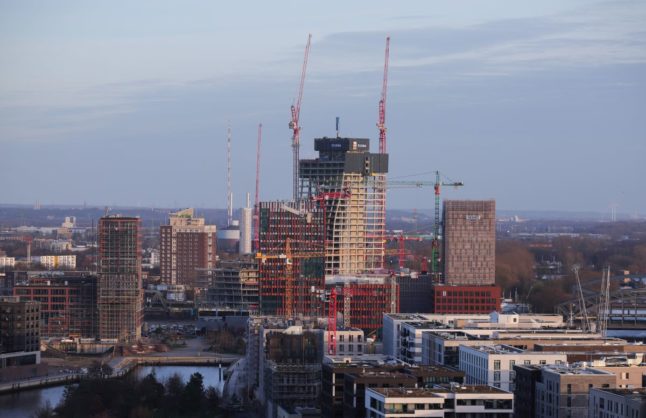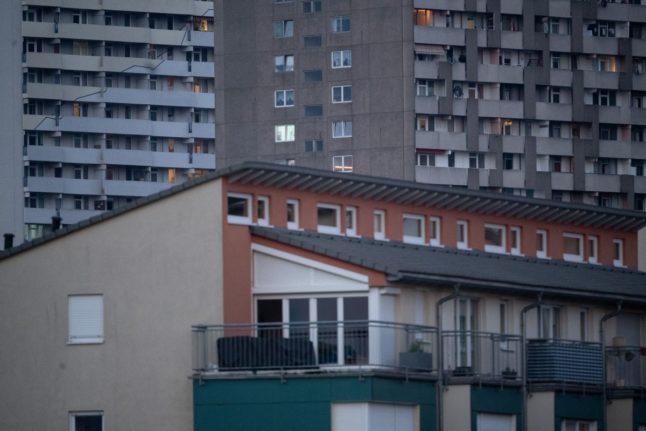Making living space out of unused working space is not a new idea, but the trend has gained further interest in recent years due to growing demand for housing in large cities coupled with an increasing share of remote workers.
The potential number of apartments that could be created in converted office buildings is big, but in reality few of these projects make it to completion. Industry experts suggest that bureaucratic and monetary barriers are among the biggest hurdles.
Commercial real estate brokerage house, Jones Lang Lasalle (JLL), calculated that 20,000 apartments could be created in the near term in Germany’s seven largest cities alone. According to the business newspaper Wirschafts Woche, this could reduce demand by about a quarter.
Düsseldorf and Stuttgart in particular both have good potential for creating a lot of apartments through office conversions.
Additionally, Berliner Zeitung reported this week that the capital city could add up to 2,500 apartments to the market in 2025 if vacant offices were converted to apartments.
Frankfurt, however, remains the nation’s leader in this endeavour. With 1,200 residential units to be converted over the next four years, even in Germany’s business capital, it seems the process is still a slow one.
How much available space is there?
JLL told Berliner Zeitung that around 5.4 percent of Berlin’s office space is currently vacant, which amounts to 1.19 million square metres of space.
A further 1.5 million square metres of office space is expected to be added to Berlin’s real estate market by 2026, according to the Senate Department for Urban Development.
Meanwhile the demand for office space has fallen significantly as increasingly more employees have started working from home after the pandemic.
READ ALSO: How employees in Germany can pay less tax this year for working from home
JLL’s Berlin branch manager, Anja Schuhmann, said that a little over 500,000 square metres of new office space were let in Berlin last year as compared to almost one million square metres in 2019.
Considering the amount of office space expected to come onto the market in the near term and the falling demand – and based on average apartment size of 65 square metres – JLL estimates that 2,500 apartments could be created in Berlin by the end of next year.
But if that speed could really be achieved in Berlin is another question. For context, the city of Paris has converted nearly 600,000 square metres of offices since 2001, resulting in the creation of 400 to 500 homes each year, according to independent real estate consultancy Knight Frank.
Compared with constructing new apartment buildings, repurposing vacant buildings reduces land use impacts and allows for more densely populated urban centres. Additionally it allows the owners of now vacant office buildings to profit from the use of buildings that may not otherwise find renters.

Converting buildings comes with a number of challenges
Considering the capital city’s desperate need for housing, the Berlin Senate has previously set a goal of supplying 20,000 apartments per year.
While 2,500 additional apartments would be a significant step in the right direction, it still leaves a significant gap to be filled. But there are a number of challenges involved with converting buildings, such as zoning regulations, that have so far prevented even most potential conversions from going forward.
READ ALSO: Where in Europe have house prices and rent costs increased the most?
The biggest obstacle tends to be building codes and ordinances. Local governments reject a lot of proposed conversion projects, because they don’t meet certain requirements such as parking requirements for residential units.
Also, office buildings can located in neighbourhoods that are not ideal for living due to noise pollution issues. For one project in Frankfurt, for example, the balconies of units facing an industrial operation required additional insulation to reduce the sound.
When a building has a simple floor plan, a conversion can be completed within six months and half the cost of new construction, according to industry developers. But more complex conversions can require gutting a building down to its concrete skeleton. In this case costs can come closer to a new build.
Schuhmann suggests that local subsidy programs would probably be necessary for building conversion projects to be profitable. In the US, for example, billions in subsidies to the industry through the Inflation Reduction Act has resulted in more offices being converted into apartments in 2023 than ever before.
Lack of adequate housing remains a challenge for Germany
Beyond the capital city, Germany is experiencing a severe housing shortage throughout the country.
In response, the German government had set a target of building 400,000 new homes each year – a target that has continually been missed.
Last autumn, German politicians and construction industry leaders gathered at a summit to discuss solutions to the housing crisis.
A couple of the attempted solutions that came out of the summit included easier access to housing loans for families, and providing additional funding and tax breaks for the construction of affordable housing.
READ ALSO: What is Germany doing to solve its housing crisis?




 Please whitelist us to continue reading.
Please whitelist us to continue reading.
Member comments